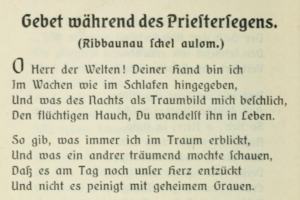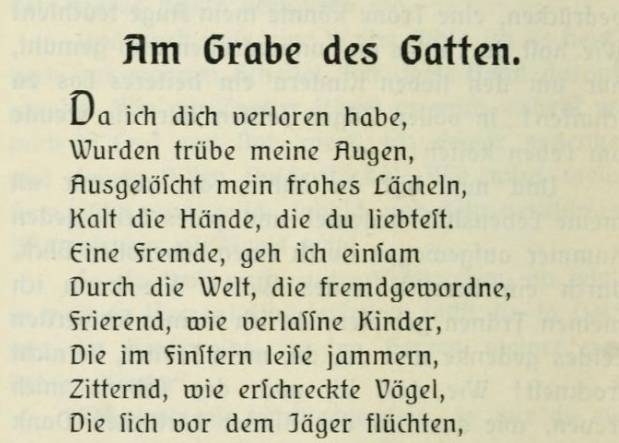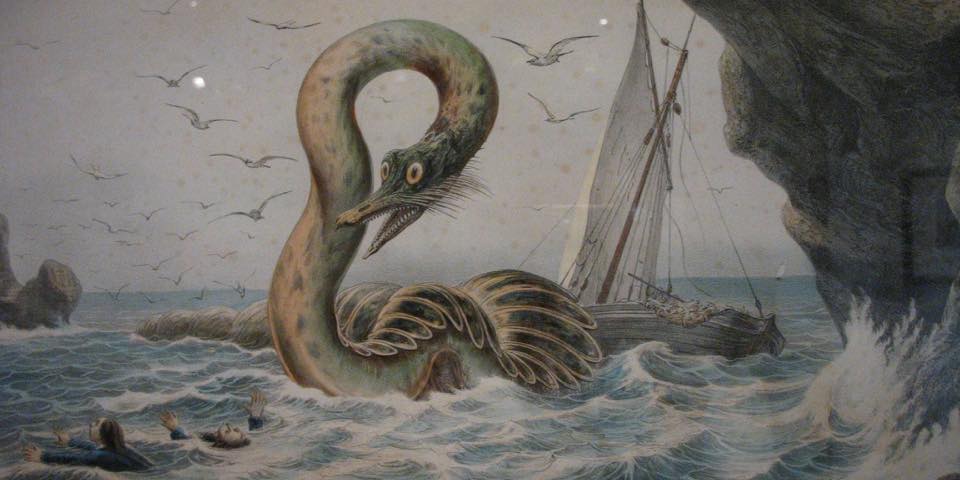| Source (German) | Paraliturgical Translation (English) |
|---|---|
Gebet während des Priestersegens. (Ribbaunau schel aulom.) |
Prayer during the priestly blessing |
O Herr der Welten! Deiner Hand bin ich Im Wachen wie im Schlafen hingegeben, Und was des Nachts als Traumbild mich beschlich, Den flüchtigen Hauch, Du wandelst ihn in Leben. |
O Lord of the Worlds! In your hands am I Suspended between waking and sleeping, And what came to me as a dream vision at night, This fleeting breath, you bring it to life. |
So gib, was immer ich im Traum erblickt, Und was ein andrer träumend mochte schauen, Daß es am Tag noch unser Herz entzückt Und nicht es peinigt mit geheimem Grauen. |
So grant, [that] whatever I behold in a dream, And what another dreaming might observe, That it delight our hearts even in daytime And it not torment [us] with arcane horror. |
Und was sich je in stillverichwieg’ner Nacht Vor unsrer Sehnsucht lockend hat gezeigt, Das möge uns gewähren Deine Macht, Wenn aus dem Dunkel Licht und Leben steigt! |
And whatever has revealed itself in a quiet night Before our wishful craving has manifested, May your might grant to us that, Out of the darkness shall rise light and life! |
Doch wenn geängstet uns ein wirres Bild, Da hilflos wir vom tiefen Schlaf befangen, So wandle Du in Glück es hulderfüllt Und nimm von unsrer Seele Furcht und Bangen! |
But when a confused image frightens us, As we are helplessly immersed in deep sleep, So gracefully transform it in happiness And remove from our soul fear and anxiety! |
Und heile sie von ihrem kranken Wahn, Wie Chiskia Du geheilt, der vor Dir klagte, Und wie Du der Prophetin hast getan Und Na’mam, den ein böser Aussatz plagte. | |
Und wie die Wasser, die voll Bitterkeit Einst heilsam wurden und zu frischen Quellen, So mög’, was uns bedroht als finst’res Leid, Im Licht des Tags zur Freude sich erhellen! |
And like the waters, which full of bitterness Once became healing and fresh springs, So may what threatens us as dark sorrow, Brighten in the light of day to joy! |
Ja, wie Du einst den Fluch des Bileam In seinem Mund gewandelt hast in Segen, So lasse, was des Nachts als Schreckbild kam Am Tag mit Wonne unser Herz bewegen! |
Yes, as you once changed the curse of Balaam Changing it into a blessing in his mouth, So let what came as a horror at night Move our hearts with delight in the daytime! |
O Herr, erhaben über Zeit und Raum! Was immer mir für nächt’ge Bilder kamen, Du wandelst Traum zu Leben, Tat zu Traum, Drum schütze mich und sei mir gnädig! |
O Lord, exalted above time and space! Whatever visions came to me at night, It is you who bring dreams to life, who actualizes dreams, Therefore protect me and be merciful to me! |
Amen! |
Amen! |
This paraliturgical prayer-poem, “Gebet während des Priestersegens (Ribbaunau schel aulom)” by Lise Tarlau, can be found in Rabbi Max Grunwald’s anthology of Jewish women’s prayer, Beruria: Gebet- und Andachtsbuch für jüdische Frauen und Mädchen (1907), pages 318-319.
The transcription of the German provided machine-readable text for machine translations by DeepL, which we then edited for accuracy and clarity. We welcome any/all corrections, improvements, and additional transcriptions and translations of this work’s contents. –Aharon Varady
Source(s)


“Gebet während des Priestersegens (Ribbaunau schel aulom) | Prayer during the priestly blessing, by Lise Tarlau (1907)” is shared through the Open Siddur Project with a Creative Commons Attribution-ShareAlike 4.0 International copyleft license.










Leave a Reply